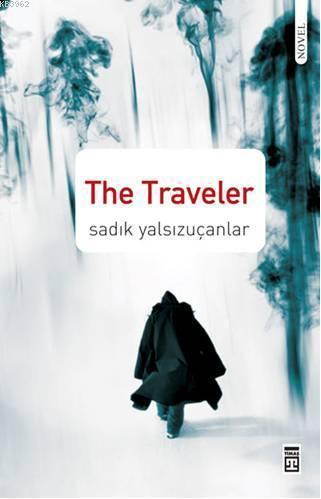The Traveler
Açıklama
The Traveler
"A pearl from the East, a narrative that demands tranquility"
The Traveler represents the door of contemporary Turkish literature opening to the West... One of the first mystical novels to be translated into a Western language, The Traveler has been published in Germany by Literaturca Verlag as Der Wanderer. The English translation of the book is in progress.
The Traveler tells the story of a universal saint, which is also the story of the spiritual life of Ibn Arabi, a well-known Muslim scholar who had lived in the Middle Ages. The spiritual journey of this saint is also the story of a universal human being.
Critics describe this work, by Sadık Yalsızuçanlar, one of the most distinguished writers of contemporary Turkish literature, as an "innovative text." As a narrative which is very different from both classic and modern novels, The Traveler can also be called "a modern epic."
In the novel, the author tells us about the several phases of Ibn Arabi's spiritual life, such as the encounter between Ibn Rusd and Ibn Arabi: they stay together for a few hours, yet they speak only two words: Yes and No.
The saint's teenage years and his initial visions... the days that Ibn Arabi spent with el-Müsenna, the most well-known female saint in Andalusia their meeting with the Ethiopian, Abdullah. Later, Ibnü'l Arabi's travels begin. We follow him on his trip to Mecca, see his acquisition of authority through hadith, and witness his vision during his circumambulation of the Kaaba
In a sense, The Traveler is based on Ibnü'l Arabi's visions. In this respect, it is the story of a human who has reached spiritual maturity. This is the process of an individual becoming an "ideal human," or a mature saint, step by step. In this episodic novel, each episode, whether of five-six pages or three lines, reflects the spiritual transformation of the saint.
In the subsequent chapters of the novel, Arabi's trips to Morocco, Tunusia, Egypt, Damascus, Baghdad, Mecca, Medina, Malatya, and Konya are described. Each of these trips corresponds not only to a physical change of location, but also to a new spiritual phase in his development.
The Sheikhs, wise men, and scholars that the Saint meets, and from whom he was nourished, are all described, as are his marriages, friendships, and writings...
The narrative is also interwoven with various tales from Muslim scholars such as Hallac-i Mansour, Rabiatu'l Adeviyye, Hasan-i Basri, Bayezid-i Bistami, and Uveysu'l- Karani.
German national radio said of The Traveler:
This is a pearl from the East - historically, philosophically, and in a literary sense. This is a narrative that needs tranquility...
This is a book that consists of anecdotes, images, parables, and puzzles which retain their mystery. The Traveler strongly reminds me of Siddharta by Herman Hesse: it is a story of a traveler who is looking for himself...
Sadık Yalsızuçanlar is remarkable for his profound knowledge of Western philosophy - from the Greeks to Martin Luther and Sartre. What make this novel extraordinary are its philosophical depth, absolute modernity, and overflowing poetic narration.
Ibn Arabi is known for his 'revolutionary' identity in Islamic philosophy. According to him, all religions share a common root, and all humans are brothers, sisters and equals. For instance, in one of the chapters of the novel, Arabi is inspired during the circumambulation of Kaaba: He feels himself not only to be a Muslim, but also a follower of Jesus and Moses.
Kitap Ayrıntıları
Stok Kodu
:
9789752637870
Boyut
:
135-210-0
Sayfa Sayısı
:
272
Basım Yeri
:
İstanbul
Baskı
:
2
Basım Tarihi
:
2009-03-28
Çeviren
:
Çiğdem Aksoy
Kapak Türü
:
Karton
Kağıt Türü
:
2.Hamur
Dili
:
İngilizce
9789752637870
223552

https://www.benlikitap.com/urun/the-traveler
The Traveler
24.31
The Traveler
"A pearl from the East, a narrative that demands tranquility"
The Traveler represents the door of contemporary Turkish literature opening to the West... One of the first mystical novels to be translated into a Western language, The Traveler has been published in Germany by Literaturca Verlag as Der Wanderer. The English translation of the book is in progress.
The Traveler tells the story of a universal saint, which is also the story of the spiritual life of Ibn Arabi, a well-known Muslim scholar who had lived in the Middle Ages. The spiritual journey of this saint is also the story of a universal human being.
Critics describe this work, by Sadık Yalsızuçanlar, one of the most distinguished writers of contemporary Turkish literature, as an "innovative text." As a narrative which is very different from both classic and modern novels, The Traveler can also be called "a modern epic."
In the novel, the author tells us about the several phases of Ibn Arabi's spiritual life, such as the encounter between Ibn Rusd and Ibn Arabi: they stay together for a few hours, yet they speak only two words: Yes and No.
The saint's teenage years and his initial visions... the days that Ibn Arabi spent with el-Müsenna, the most well-known female saint in Andalusia their meeting with the Ethiopian, Abdullah. Later, Ibnü'l Arabi's travels begin. We follow him on his trip to Mecca, see his acquisition of authority through hadith, and witness his vision during his circumambulation of the Kaaba
In a sense, The Traveler is based on Ibnü'l Arabi's visions. In this respect, it is the story of a human who has reached spiritual maturity. This is the process of an individual becoming an "ideal human," or a mature saint, step by step. In this episodic novel, each episode, whether of five-six pages or three lines, reflects the spiritual transformation of the saint.
In the subsequent chapters of the novel, Arabi's trips to Morocco, Tunusia, Egypt, Damascus, Baghdad, Mecca, Medina, Malatya, and Konya are described. Each of these trips corresponds not only to a physical change of location, but also to a new spiritual phase in his development.
The Sheikhs, wise men, and scholars that the Saint meets, and from whom he was nourished, are all described, as are his marriages, friendships, and writings...
The narrative is also interwoven with various tales from Muslim scholars such as Hallac-i Mansour, Rabiatu'l Adeviyye, Hasan-i Basri, Bayezid-i Bistami, and Uveysu'l- Karani.
German national radio said of The Traveler:
This is a pearl from the East - historically, philosophically, and in a literary sense. This is a narrative that needs tranquility...
This is a book that consists of anecdotes, images, parables, and puzzles which retain their mystery. The Traveler strongly reminds me of Siddharta by Herman Hesse: it is a story of a traveler who is looking for himself...
Sadık Yalsızuçanlar is remarkable for his profound knowledge of Western philosophy - from the Greeks to Martin Luther and Sartre. What make this novel extraordinary are its philosophical depth, absolute modernity, and overflowing poetic narration.
Ibn Arabi is known for his 'revolutionary' identity in Islamic philosophy. According to him, all religions share a common root, and all humans are brothers, sisters and equals. For instance, in one of the chapters of the novel, Arabi is inspired during the circumambulation of Kaaba: He feels himself not only to be a Muslim, but also a follower of Jesus and Moses.




















